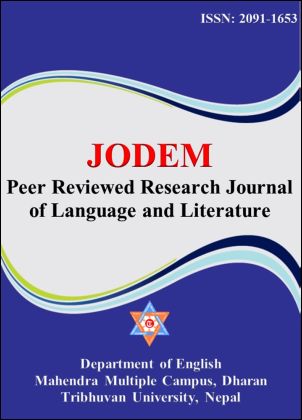Transnationals’ Search for Home in Bhattarai's Muglan
DOI:
https://doi.org/10.3126/jodem.v13i1.47469Keywords:
Diaspora, home, homelessness, identity, transnationalsAbstract
This article addresses the issue of Nepali transnationals’ search for home as depicted in Govinda Raj Bhattarai’s novel Muglan. The novel presents three types of transnationals as its characters: diasporans, transnational mobiles and transnational outsiders. Throughout the life, all of them go on searching for a home that can provide them comfort, security and peace of mind. But none of the characters can achieve it. The novel presents the reality of Nepali transnational migration that is continued for centuries. For the analysis of the characters and their condition and consequences, the theories of transnationalism and diaspora have been used. Janine Dahinden’s idea of three types of transnational migrants and Steven Vertovec’s discussion on the practice of cultural diaspora have been the main theoretical bases for this study. Both of the theorists claim that the transnationals leave their homeland with the motive of making their home back in the land of origin better than that of the time they leave it. Throughout their stay in the host land, they try to achieve their goal sacrificing everything they have. Some of them try to find their dream home even in the host land. But finally, they cannot achieve their dream in the reality. So, the transnationals remain homeless throughout. Bhattarai’s Muglan gives fictio-realistic expression to this theoretical claim.
Downloads
Downloads
Published
How to Cite
Issue
Section
License
© Department of English, Mahendra Multiple Campus, Dharan, Nepal

